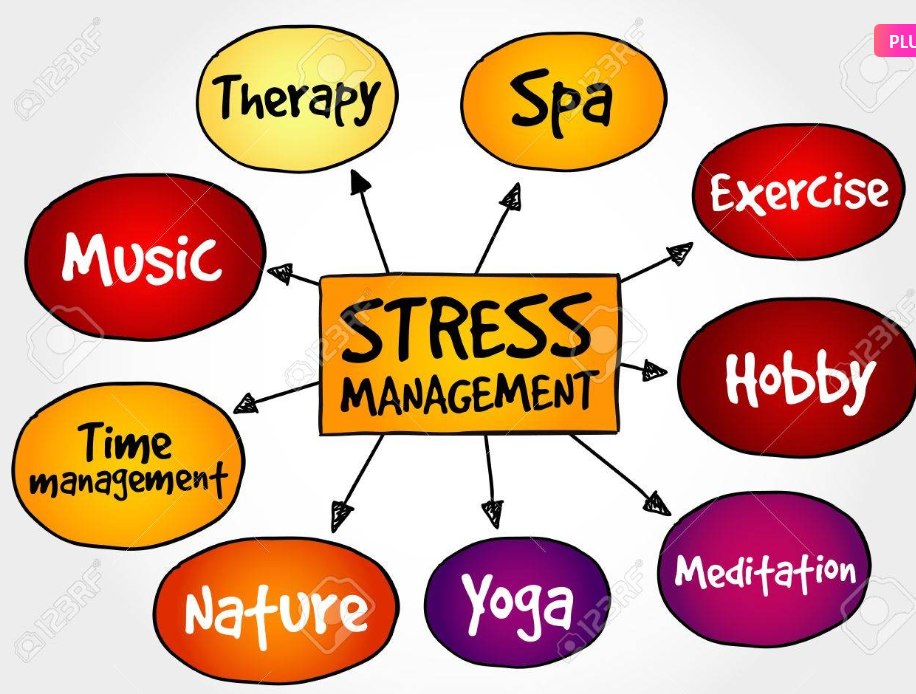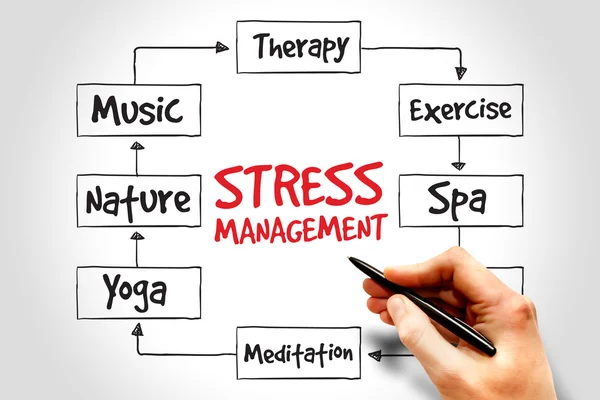In our fast-paced, demanding world, stress has become an unwelcome companion for many individuals. From work deadlines and family obligations to financial pressures and societal expectations, the sources of stress seem endless. However, left unchecked, chronic stress can take a toll on our physical and mental well-being, leading to a host of adverse effects, including anxiety, depression, and even serious health issues.
Fortunately, there is a toolkit of practical solutions that can help us manage stress effectively and reclaim a sense of balance in our lives. By incorporating these strategies into our daily routines, we can cultivate resilience, enhance our overall well-being, and thrive in the face of modern-day challenges.

Fig 1- Stress Management
1. Mindfulness and Meditation
Mindfulness and meditation are powerful tools for managing stress and promoting inner calm. These practices involve focusing your attention on the present moment, allowing you to disengage from anxious thoughts and overwhelming emotions. By cultivating a non-judgmental awareness of your thoughts and sensations, you can develop a greater sense of clarity and emotional equilibrium.
Incorporating mindfulness exercises, such as deep breathing, body scans, or guided meditations, into your daily routine can have profound effects on your stress levels. Even dedicating a few minutes each day to mindful practice can help you navigate challenging situations with greater ease and presence of mind.
2. Physical Exercise and Movement
Regular physical activity is not only beneficial for your physical health but also plays a crucial role in stress management. Exercise releases endorphins, the body’s natural mood-boosters, and helps reduce muscle tension and anxiety. Whether it’s a brisk walk, a yoga session, or a high-intensity workout, finding an enjoyable form of exercise that suits your preferences can be an effective stress-busting strategy.
Engaging in physical activity can also serve as a healthy outlet for pent-up emotions and offer a much-needed break from the stressors of daily life. Additionally, exercise can improve sleep quality, which is essential for managing stress and promoting overall well-being.
3. Time Management and Prioritization
In our fast-paced world, feeling overwhelmed by too many tasks and commitments is a common source of stress. Effective time management and prioritization skills can help you regain control and reduce the pressure of competing demands.
Begin by identifying your most important tasks and priorities, and allocate your time and energy accordingly. Learn to say “no” to non-essential commitments, and delegate responsibilities when possible. Implement productivity techniques, such as the Pomodoro method or time blocking, to enhance your focus and efficiency.
Remember, it’s also crucial to schedule dedicated time for self-care activities, such as relaxation, hobbies, or spending time with loved ones. By creating a balanced schedule that aligns with your values and priorities, you can minimize stress and cultivate a greater sense of fulfillment.
4. Social Support and Connections
Human beings are social creatures, and strong social connections can serve as a powerful buffer against stress. Maintaining a supportive network of family, friends, and colleagues can provide a sense of belonging, emotional support, and practical assistance during challenging times.
Make time to nurture your relationships and engage in activities that foster meaningful connections. Whether it’s sharing a meal with friends, joining a club or group with shared interests, or simply reaching out to loved ones for a heart-to-heart conversation, prioritizing social connections can bolster your resilience and help you navigate stressful situations with greater ease.
5. Stress-Relieving Techniques
In addition to the strategies mentioned above, there are various stress-relieving techniques that can provide immediate relief during moments of heightened stress or anxiety. These techniques include deep breathing exercises, progressive muscle relaxation, visualization exercises, journaling, and engaging in hobbies or creative pursuits.
Experiment with different techniques to find what works best for you, and create a personalized toolkit of stress-relieving strategies that you can access whenever needed. Remember, the key is to practice these techniques regularly, even when you’re not feeling particularly stressed, to build resilience and develop a habit of self-care.
Managing stress is a continuous journey, and finding the right combination of strategies that resonate with your unique needs and lifestyle is essential. By incorporating these practical solutions into your daily routine, you can cultivate a greater sense of balance, resilience, and overall well-being in the face of modern-day challenges.
Remember, stress is a natural part of life, but it doesn’t have to control you. Embrace these tools and strategies, and take proactive steps towards cultivating a life of greater harmony, joy, and fulfillment.

